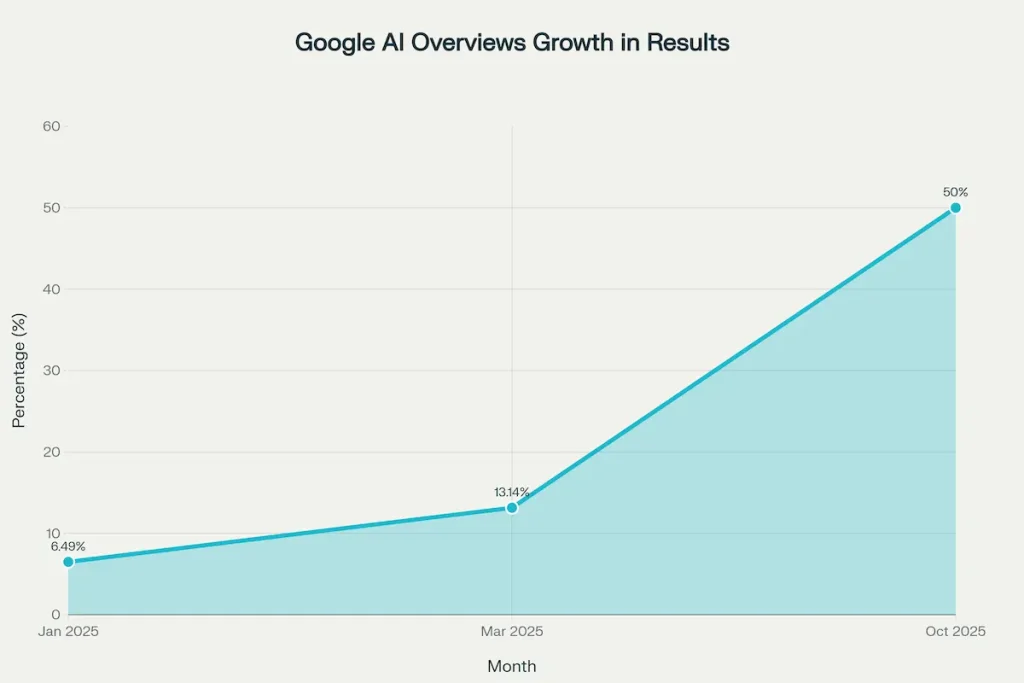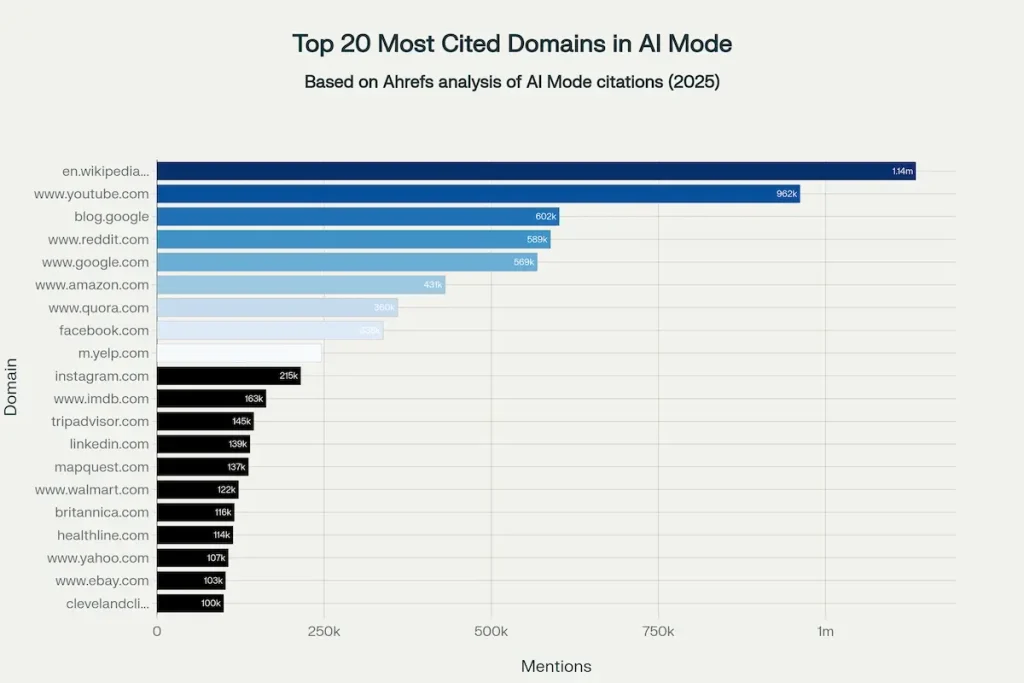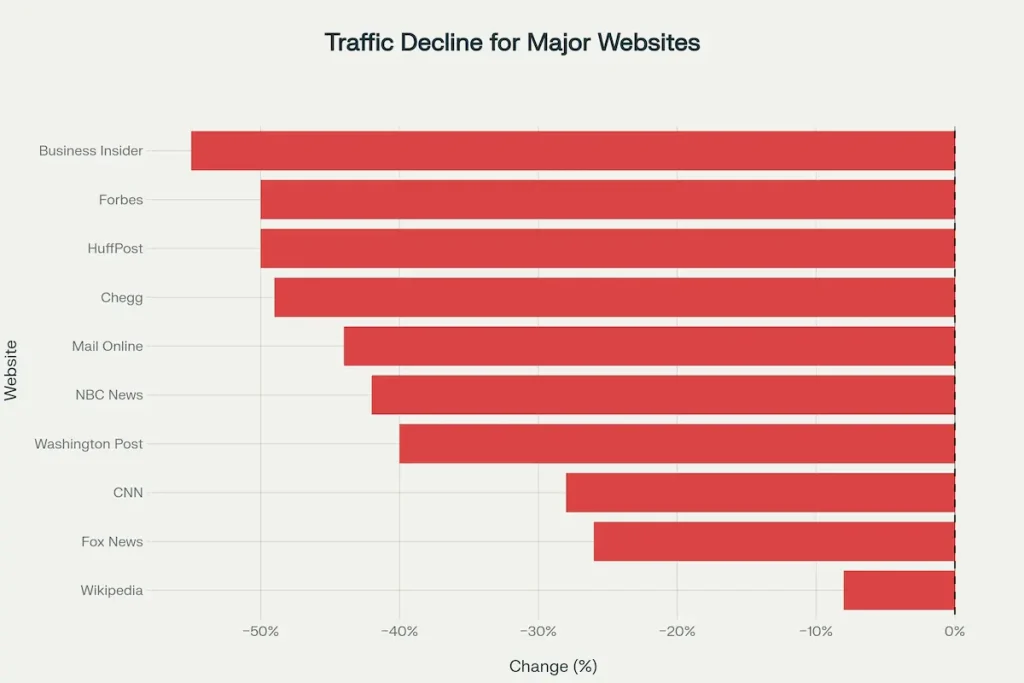The Rise of AI Overviews
The introduction of Google’s AI Overviews has fundamentally restructured the digital information ecosystem, creating unprecedented shifts in website traffic patterns and citation hierarchies. Between 2024 and 2025, this AI-powered search feature expanded from appearing in just 6.49% of searches to dominating over 50% of all queries, triggering what industry observers describe as the most significant transformation in search engine behavior since Google’s inception. This comprehensive analysis examines which domains Google’s AI systems cite most frequently and quantifies the dramatic traffic changes these high-authority sites experienced during this pivotal year.
By the end of this report, you’ll see which domains dominate Google’s AI citations, how AI Overviews reshape traffic flows, and what patterns define winners and losers in 2025.

Based on analysis of over 36 million AI Overviews and 46 million citations between March and August 2025, a clear pattern emerges: Wikipedia, YouTube, Google’s own properties, Reddit, and Amazon constitute the new aristocracy of AI-cited sources, collectively accounting for 38% of all citations. Yet paradoxically, even these most-cited domains are not immune to traffic erosion, with Wikipedia itself experiencing an 8% decline in human pageviews despite being the single most referenced source. This disconnect between citation frequency and traffic generation represents a fundamental break from traditional search dynamics, where high visibility typically correlated with increased visits.
Top 20 domains most frequently cited in Google AI Mode, with Wikipedia leading at over 1.1 million mentions.

The Citation Hierarchy: Who Dominates Google’s AI Results?
Dominant Players: The Top Five
Research conducted by Ahrefs analyzing Google’s AI Mode reveals a striking concentration of citations among a relatively small number of domains. Wikipedia commands the top position with an overwhelming 1,135,007 mentions, representing 11.22% of all citations tracked. This dominance reflects AI systems’ preference for the encyclopedia’s structured, neutral, and comprehensive coverage of virtually every topic imaginable.
YouTube secures second place with 961,938 mentions (9.51% of citations), demonstrating Google’s strategic advantage in promoting its own video platform. The prominence of video content aligns with evolving user preferences, particularly among younger demographics who increasingly favor visual explanations over text-based content. YouTube’s position underscores a critical shift: AI Overviews are pulling from a broader content spectrum than traditional search, including multimedia sources that provide practical, demonstrative answers.
The third position belongs to blog.google, with 601,835 mentions (5.95%), part of a larger pattern of self-referential behavior. Analysis shows that 43% of AI Overviews contain links redirecting users to Google’s own properties, including google.com, support.google.com, and play.google.com. This self-serving tendency raises questions about competitive fairness and the integrity of AI-generated recommendations.
Reddit occupies fourth place with 588,596 mentions (5.82%), though this figure understates Reddit’s explosive growth trajectory. Between March and June 2025, Reddit’s citation rate surged from 1.30% to 7.15%—a staggering 450% increase in just three months. In Google AI Overviews specifically (as distinct from AI Mode), Reddit commands an even more dominant 21% share of citations, positioning it as the premier source for user-generated perspectives that AI systems increasingly value.
Google.com rounds out the top five with 568,774 mentions (5.62%). When combined with other Google ecosystem properties (blog.google, support.google, play.google.com, and YouTube), Google-controlled domains account for 2,306,551 citations—22.81% of all mentions. This concentration grants Google unprecedented control over information flow in the AI search era.
The Extended Elite: Positions 6-20
Beyond the top five, a diverse array of platforms commands significant citation shares. Amazon ranks sixth with 431,080 mentions, reflecting e-commerce’s integration into informational queries. Quora (360,239 mentions) and Facebook (338,391 mentions) demonstrate AI’s appetite for community-driven content.
Local and review platforms feature prominently, with Yelp (246,155 mentions) and TripAdvisor (144,918 mentions) serving practical, location-based queries. Professional networking site LinkedIn (139,177 mentions) and entertainment database IMDb (163,224 mentions) round out specialized informational niches.
Health and medical domains maintain strong presence despite traffic concerns, with Healthline (113,728 mentions), Cleveland Clinic (99,680 mentions), Mayo Clinic (89,103 mentions), and WebMD (87,025 mentions) all ranking in the top 25. This concentration suggests AI systems prioritize medical authority, though health publishers anticipate 20-35% session losses as AI Overviews answer queries directly.
Reference sources beyond Wikipedia also perform well, including Britannica (115,790 mentions) and multiple dictionary platforms: Merriam-Webster (78,354 mentions), Dictionary.com (56,852 mentions), and Cambridge Dictionary (33,658 mentions). Major news organizations appear but at lower rankings: New York Times (60,340 mentions), Forbes (44,131 mentions), USA Today (44,579 mentions), CNN (32,373 mentions), and Business Insider (60,467 mentions).
The top 20 domains collectively account for 66.18% of all citations, revealing significant concentration. The top 10 domains capture 53.87% of citations, while just the top five represent 38.13%. This winner-takes-most dynamic creates formidable barriers for smaller publishers seeking AI visibility.
Traffic Impact by Industry

News & Media: The Biggest Losers
Traditional news outlets have suffered the most severe traffic declines, with losses ranging from 26% to 55% year-over-year. Business Insider and its affiliated sites experienced the steepest drop: a 55% decline in organic search traffic between April 2022 and April 2025, according to Similarweb data. This represents more than half of the site’s search-driven audience vanishing as AI summaries replaced the need to visit original sources.
Forbes and HuffPost both recorded 50% traffic losses, devastating blows for publishers whose business models depend on advertising revenue tied to pageviews. These declines occurred despite Forbes maintaining significant presence in AI citations (44,131 mentions, ranking 49th). The disconnect illustrates a crucial reality: being cited in AI Overviews does not translate to proportional traffic.
The Washington Post lost 40% of its traffic, NBC News declined 42%, and Mail Online dropped 44%. Even relative winners in the news category suffered substantial losses, with CNN down 28% and Fox News declining 26%.
Aggregating across the entire news sector, organic traffic to news websites plummeted from a peak of 2.3 billion monthly visits in mid-2024 to under 1.7 billion by May 2025—a loss exceeding 600 million monthly visits in less than one year. This 26% sectoral decline threatens the financial viability of journalism as zero-click searches rose from 56% to 69% of all queries.
Education & E-Learning Disruption
Perhaps the most striking paradox emerges in Wikipedia’s data. Despite being the most cited source with over 1.1 million mentions, the online encyclopedia experienced an 8% decline in human pageviews comparing 2025 to 2024.
Marshall Miller, Senior Director of Product at the Wikimedia Foundation, attributed the decline to “the impact of generative AI and social media on how people seek information,” noting that “search engines are increasingly using generative AI to provide answers directly to searchers rather than linking to sites like ours”. The foundation identified this pattern after revising its bot-detection systems revealed that much of the spring 2025 traffic spike consisted of AI bots scraping content rather than human readers.
Wikipedia’s predicament illustrates a troubling dynamic: AI systems extract value from high-quality content sources while simultaneously reducing traffic to those sources. The encyclopedia reported a 50% surge in bandwidth consumption from AI bots since January 2024, as systems scraped content for training data and citation purposes, yet human engagement declined.
ChatGPT demonstrates particularly heavy Wikipedia reliance, with the encyclopedia accounting for 47.9% of ChatGPT’s top-10 most-cited sources. Google AI Overviews show more diversified sourcing, with Wikipedia representing 5.7% of top-10 citations, yet even this reduced dependency contributes to Wikipedia’s traffic erosion.
Education & E-learning Sector
The education technology sector faced dramatic disruption. Chegg, an online education company, reported a 49% decline in non-subscriber traffic comparing January 2025 to January 2024. This near-halving of traffic occurred as AI Overviews began answering study-related questions directly, eliminating the need for students to visit educational resource sites.
Independent educational content creators and homework help sites experienced similar patterns. AI’s ability to explain concepts, solve problems, and provide study guidance directly in search results fundamentally undermined the value proposition of educational content sites whose traffic depended on students seeking explanations.
Health & Medical Publishers
Health information sites maintain strong citation presence yet face significant traffic headwinds. Healthline, cited 113,728 times in AI Mode, warned that health publishers could see 20-35% session losses as AI Overviews provide medical information directly. This represents a more aggressive answer feature than previous innovations like Featured Snippets and People Also Ask boxes, which caused 10-20% session losses.
The healthcare sector faces unique challenges because AI Overviews frequently trigger for medical queries. Healthline Media reported that 45% of medical keywords they tracked returned an AI Overview by July 2024. This high trigger rate means health publishers face AI competition on most of their core content topics.
Despite these concerns, health domains demonstrate relative resilience compared to news publishers. Mayo Clinic, Cleveland Clinic, and WebMD all maintain top-25 citation rankings, suggesting that medical authority and E-E-A-T (Experience, Expertise, Authoritativeness, Trustworthiness) signals help health sites retain AI visibility even as traffic declines.
Reddit: The Notable Exception
Reddit emerges as a clear winner in the AI Overview era. While most publishers experienced traffic declines, Reddit’s overall traffic grew to 1.4 billion monthly visits by April 2025, supported by its explosive growth in AI citations—a 450% increase from March to June 2025.
Reddit’s success stems from multiple factors. First, its user-generated content style aligns with AI systems’ preference for authentic, experience-based perspectives. Second, Reddit’s partnership with Google to license data for AI training (announced February 2024) likely enhanced its visibility. Third, Reddit content addresses real user questions with practical, conversational responses that AI systems find valuable for summarization. This prioritization of human-centric data explains why high-authority aggregators now dominate the list of the most cited domains in ai overviews, fundamentally changing the landscape of organic visibility. Identifying these top-tier sources is essential for contextualizing how search visibility translates into actual click-through rates.
In Google AI Overviews specifically, Reddit accounts for 21% of citations, while Perplexity AI relies on Reddit for 46.5% of its citations. This multi-platform AI presence positions Reddit as a primary information source in the emerging AI search ecosystem.
Click-Through Rate Collapse
The CTR Crisis
Multiple independent studies demonstrate severe click-through rate degradation when AI Overviews appear. Ahrefs analyzed 300,000 keywords and found a 34.5% drop in CTR for position-one organic results when AI Overviews were present. This represents more than one-third of potential traffic evaporating despite maintaining the coveted top ranking.
Amsive conducted a larger study of 700,000 keywords, finding an average 15.49% CTR decline, with losses reaching 37.04% when AI Overviews appeared alongside Featured Snippets. The combination of multiple answer features creates a compounding traffic suppression effect.
Authoritas research revealed even more dramatic impacts: when AI Overviews appear, the top organic link’s CTR drops by approximately 79%. Desktop traffic declined 56.1% while mobile traffic fell 48.2% in case studies of affected publishers.
Zero-Click Search Explosion
The Pew Research Center study provided rigorous behavioral data by tracking 68,879 actual Google searches conducted by 900 U.S. adults in March 2025. The findings confirm the existential threat AI Overviews pose to traditional search traffic:
- Only 8% of users who encountered an AI Overview clicked on a traditional search result, compared to 15% when no AI summary appeared
- 26% of searches with AI Overviews ended with no clicks at all, compared to 16% for traditional results pages
- Less than 1% of users clicked on links within the AI Overview itself
Similarweb data tracking broader trends showed zero-click searches increasing from 56% in 2024 to 69% by May 2025. This means nearly seven out of ten searches now conclude on Google’s results page without generating any website traffic.
BrightEdge data revealed a silver lining amid the decline: while CTR dropped 30%, impressions increased 49%. This suggests Google usage is growing even as individual site traffic falls—Google retains users longer within its ecosystem while distributing fewer clicks to external sites.
Industry-Specific CTR Variations
The impact varies significantly by query type and industry. Non-branded, informational queries suffer the most severe CTR degradation, with Amsive reporting a 19.98% decline for non-branded keywords. These queries—which include “how to,” “what is,” and “best practices” content—represent the core of many publishers’ SEO strategies.
Branded searches prove more resilient, as users seeking specific companies or products still need to visit the actual site. Local service businesses (lawyers, plumbers, contractors) experience less dramatic impacts because users ultimately need to contact providers directly.
Certain query categories saw explosive AI Overview growth. Between March 13-27, 2025, BrightEdge documented:
- Entertainment queries: +528% increase in AI Overview presence
- Restaurant queries: +387% increase
- Travel queries: +381% increase
These verticals now face near-universal AI competition for organic visibility.
From Search Engine to Answer Engine
Walled Garden Dynamics
Google’s transformation from a “search engine” directing traffic to external sources into an “answer engine” satisfying intent directly represents a fundamental paradigm shift. This evolution benefits Google financially by extending user session duration and increasing ad exposure while simultaneously eroding the value proposition of content creators who provide the information Google’s AI summarizes.
The 43% self-referential citation rate—where AI Overviews link back to Google’s own properties—reinforces what critics describe as “walled garden” behavior. Studies show Google users now make 10 clicks before visiting other websites, up significantly from previous years. This extended dwell time on Google properties before (or instead of) visiting external sites concentrates value within Google’s ecosystem.
AI Overviews push organic results down by 1,500 pixels on desktop and more on mobile—equivalent to 2-3 full scrolls. This displacement reduces visibility even for top-ranking results, as users consume AI-generated summaries before encountering traditional listings.
Winner-Takes-Most Economy
Citation concentration data reveals a winner-takes-most dynamic. The top 5 domains capture 38% of citations, top 10 secure 54%, and top 20 command 66%. This concentration makes it extremely difficult for smaller publishers, niche sites, and emerging voices to gain AI visibility.
User-generated content platforms (Reddit, YouTube, Quora, Medium) collectively account for significant citation share, with Reddit alone growing to 21% of AI Overview citations. This shift privileges community discussions and authentic user experiences over professionally produced editorial content, disrupting traditional publishing business models.
Google properties (including YouTube) control 23% of citations, granting the company enormous power over information distribution. Combined with the 43% self-referential linking behavior, Google shapes both what sources AI cites and where users go for additional information.
Platform Citation Behavior
Different AI platforms demonstrate distinct source preferences:
ChatGPT shows strong preference for authoritative, encyclopedic content:
- Wikipedia: 47.9% of top-10 citations
- Reddit: 11%
- Forbes and other traditional publishers maintain presence
Perplexity heavily favors user-generated content:
- Reddit: 46.5% of citations
- YouTube: 19%
- Quora: 14%
Google AI Overviews balance authority and authenticity:
- Reddit: 21%
- YouTube: 18.8%
- Quora: 14.3%
Google AI Mode skews more authoritative:
- Wikipedia: 11.22%
- YouTube: 9.51%
- blog.google: 5.95%
This platform variation suggests publishers must optimize for multiple AI systems with different source preferences, adding complexity to already-challenging adaptation requirements.
Strategic Implications and the Path Forward
The Death of Traditional SEO?
The data unequivocally demonstrates that traditional SEO success metrics no longer correlate with traffic outcomes. Forbes ranks for thousands of keywords yet lost 50% of its traffic. Wikipedia leads all citation counts yet experienced an 8% visitor decline. Ranking position one offers no protection against 34.5% CTR erosion.
Industry analysts predict AI search visitors will surpass traditional search visitors by early 2028, compressing the timeline for strategic adaptation. If Google makes AI Mode the default search experience, this transition could accelerate significantly. To truly grasp the implications of these fundamental changes, explore our 2025 AI-powered search visibility report, and 2025 organic search traffic crisis report, which details the new paradigm for online presence.which details the new paradigm for online presence.
The shift toward Generative Engine Optimization (GEO)—optimizing content for AI citation rather than ranking—represents the emerging strategic framework. This approach emphasizes:
- E-E-A-T signals (Experience, Expertise, Authoritativeness, Trustworthiness)
- Structured data and schema markup to facilitate machine readability
- Direct brand equity to reduce dependency on search intermediaries
- Multi-platform AI presence across ChatGPT, Perplexity, Google, and others
Content Type Strategies
Certain content types prove more resilient to AI disruption:
Experiential content providing first-hand perspectives and unique insights maintains value. Reddit’s success demonstrates that authentic user experiences and community discussions remain difficult for AI to fully replicate, even as AI summarizes them.
Multimedia content particularly video, benefits from AI’s expansion beyond text sources. YouTube’s #2 ranking reflects growing preference for visual explanations. Video content requires users to visit platforms to consume, creating inherent click-through necessity.
Deep expertise content that goes beyond surface-level information retains importance. While AI Overviews handle basic informational queries, complex analyses, nuanced perspectives, and specialized expertise remain difficult to fully summarize.
Transactional and local content resists zero-click impacts because users must ultimately visit sites to complete purchases or contact service providers. E-commerce platforms like Amazon (#6 with 431K mentions) and local directories like Yelp (246K mentions) maintain strong positions.
Industry-Specific Adaptation
News publishers face existential challenges requiring fundamental business model transformation beyond SEO optimization. Strategies include:
- Developing direct reader relationships through newsletters and subscriptions
- Creating exclusive content unavailable for AI training
- Pursuing AI platform partnerships and compensation agreements
- Diversifying traffic beyond search dependence
Health publishers must leverage medical authority and E-E-A-T signals while providing utility beyond basic information. Healthline Media’s approach includes developing tools, treatment savings programs, and care service connections that transform sites from mere information sources into health decision partners.
Educational platforms need to shift from providing answers to facilitating learning experiences, personalized paths, and interactive components that AI summaries cannot replicate.
E-commerce sites should focus on unique product curation, detailed reviews, and shopping experiences that require site visits rather than depending on informational content vulnerable to summarization.
The data from 2024-2025 definitively establishes that AI Overviews represent the most significant disruption to web traffic distribution since search engines emerged. With over 50% of searches now featuring AI-generated summaries, zero-click rates approaching 70%, and traffic declines ranging from 8% to 55%, the fundamental compact between search engines and content creators has been irrevocably altered.
Wikipedia, YouTube, Google properties, Reddit, and Amazon dominate AI citations, collectively controlling 38% of mentions. Yet even citation leadership provides no immunity from traffic erosion, as Wikipedia’s 8% decline demonstrates. The winner-takes-most concentration—with top 20 domains capturing 66% of citations—creates formidable barriers for smaller publishers.
The financial implications are severe. News publishers lost over 600 million monthly visits, educational platforms like Chegg declined 49%, and major brands including Forbes, HuffPost, and Business Insider lost half their traffic. Traditional advertising-supported business models predicated on pageviews face existential pressure as AI Overviews extract content value without generating proportional traffic.
Yet adaptation remains possible. Reddit’s 450% citation growth demonstrates that platforms providing authentic user experiences can thrive. Health sites maintain strong citation presence through authority signals. Video content benefits from consumption requirements that necessitate platform visits. Direct brand relationships reduce search dependency.
The transformation from search engine optimization to Generative Engine Optimization requires fundamental strategic reorientation. Success in the AI era demands building citation-worthy authority, creating experiences that transcend summary, establishing direct audience relationships, and diversifying beyond search dependence.
As Marshall Miller of the Wikimedia Foundation noted, fewer visits to source sites risks reducing the volunteer contributions and donations that sustain content creation. This dynamic threatens the virtuous cycle that built the open web: creators produce valuable content, search engines distribute it, traffic generates revenue, and revenue funds continued creation. AI Overviews break this cycle by extracting value without proportional compensation.
The question facing publishers, content creators, and the broader web ecosystem is whether new economic models can emerge that sustain quality content creation in a zero-click world—or whether the wealth of freely available information that powered AI’s rise will gradually erode as the incentive structures supporting it collapse. The 2024-2025 data reveals the magnitude of the challenge; the solutions remain to be determined.
References
Statistical Studies
- AI in SEO Statistics (Digitaloft) 🔗
- Google Search Statistics (SEMrush) 🔗
- Most Cited Domains in AI Mode (Ahrefs) 🔗
- AI Citation Report (SurferSEO) 🔗
- AI Overview Statistics (Wordstream) 🔗
- AI Overview Trigger Rates (BrightEdge) 🔗
- AI Search SEO Traffic Study (SEMrush) 🔗
- AI Overview Traffic Collapse (Xpert Digital) 🔗
- AI Overview Traffic Impact (Artform Agency) 🔗
- AI Overview Impact Study (GSQI) 🔗
- AI Overview Platform Citation Patterns (Profound) 🔗
- AI SEO Statistics (Ahrefs) 🔗
- SEO Video Source Material 🔗
- Zero-Click Search Explosion (Pew) 🔗
Editorial & Market Analysis
- Wikipedia’s AI Impact (Observer) 🔗
- Wikipedia Traffic Shifts (Search Engine World) 🔗
- AI and Social Impact on Wikipedia (TechCrunch) 🔗
- Wikipedia Traffic Down as AI Rises (Search Engine Journal) 🔗
- Google 43% Self-Linking Rate (Search Engine Journal) 🔗
- Reddit Growth in AI Overviews (Writesonic) 🔗
- Reddit Cited in AI Overviews (Reddit) 🔗
- Leading Brands Domains in AI Search (Amsive) 🔗
- Health Marketer Guidance (Healthline Media) 🔗
- Healthcare SEO Impact (Glacial) 🔗
- AI Feature CTR Impact (Euronews) 🔗
- Why Website Traffic Is Dropping (GetPassionFruit) 🔗
- AI SEO Deep Dive (Marie Haynes) 🔗
- Google’s AI Mode Articles (Forbes) 🔗
- How AI Search Is Draining Your Traffic (Forbes) 🔗
- Impact of AI Overviews (Search Engine Journal) 🔗
- How AI Summaries Affect Web Traffic (HumanMade) 🔗
- SEO Traffic Drop Deep Dive (SE Ranking) 🔗
- AI Overview Impact Case Study (Falia) 🔗
- AI Search Impact (Fortune) 🔗
- Google AI Overviews Traffic Decline (Emarketer) 🔗
- Walled Garden Analysis (LinkedIn) 🔗
- Facebook Neil Patel’s AI Citation Post 🔗
Market/SEO Guidance & Adaptation
- Guide to Ranking in 2025 (Single Grain) 🔗
- How AI Search Ranks Healthcare Content (WG Content Blog) 🔗
- Reddit SEO Impact (Textuar) 🔗
- AI Overview Impact Case Study (IPullRank) 🔗
Video & Multimedia
- YouTube Channel Growth 2025 (AM World Group) 🔗
- YouTube Algorithm & Organic Reach (Neil Patel) 🔗
- YouTube AI Search Impact (YouTube) 🔗

